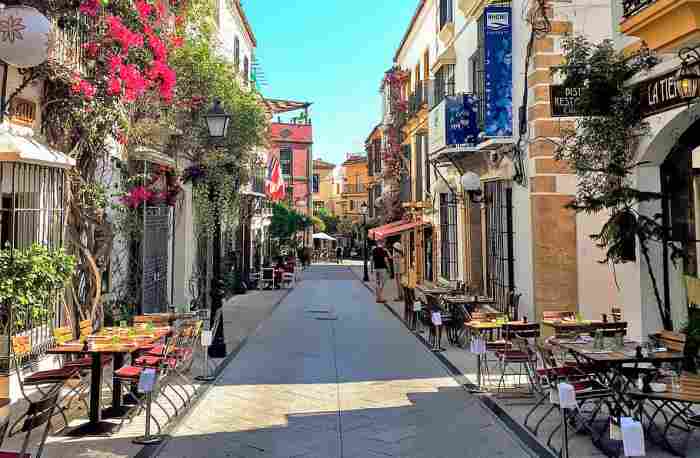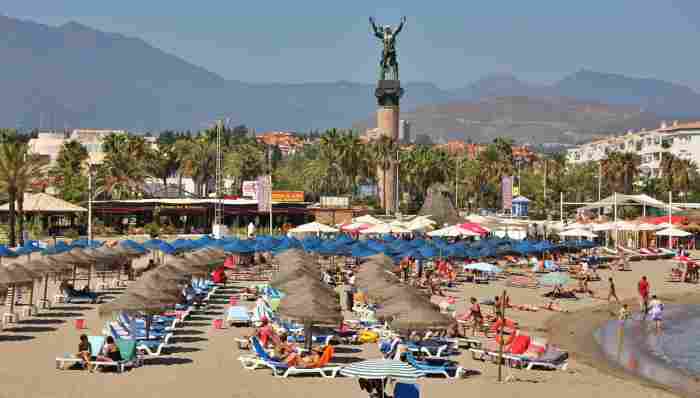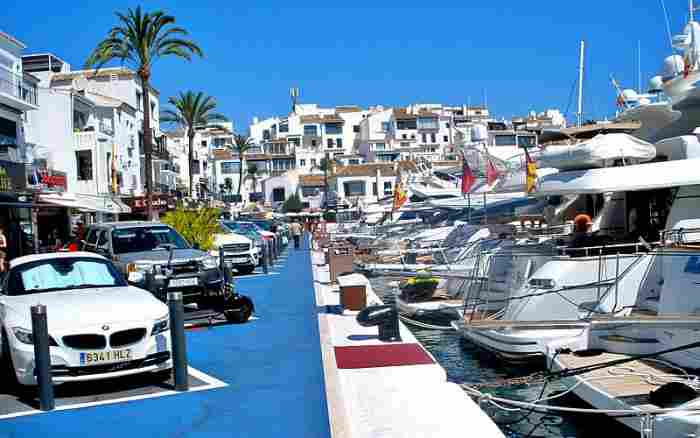Marbella on the Costa del
Sol in Andalucia is a town known as an up market holiday and shopping destination,
with prices to match, but with a lesser known much older part that is well
worth seeing. The walk is only about 4 kilometres in total and can be completed
in 2 hours. It takes you along narrow streets with many small shops selling
a vast range of goods. Each street has its own architectural character.
The suggested visits add another 2 to 3 hours.

Take the N340 towards Malaga
and leave at junction 175, signposted Marbella. Drive right into Marbella
for 6km, carrying straight on past the big roundabout, until you see a
blue 'P' (parking) sign on the right and turn right into Avenida Miquel
Cano. Take the first left, Avenida del Mar, and within a few metres on
the right there is the central underground car park costing 1.20€
per hour. Coming up the stairs you
emerge into a large pedestrian area with a series of statues down the centre
leading to the promenade. Make a note of the exit you used. Head inland.
At the top of the square go across the road and up steps to a fountain
in the Alameda Gardens. On Saturday mornings there is a small flea market
here. Go through the gardens to the main road and cross at the pedestrian
crossing. Take the street ahead, again leading inland and go to the left
of the BBVA Bank up a narrow passage.
At the end of the passage
turn right and walk into Plaza de Los Naranjos, Orange Square. This square
is packed with restaurants and is a good place to sit and spot the rich
and famous who, if in Marbella, seem to congregate here.
As you enter the square the
Tourist Information Office is in the far left corner and the Los Naranjos
Snack Bar diagonally opposite, turn left here down Chincillas and then
right down Calle Carmen taking you into Plaza de la Iglesia. On your left
are the Arab built walls of the old town.

 Marbella
has a long history before it became a holiday destination. The Phoenicians
had a small settlement that was enlarged by the Romans. Under the Nazrid
rulers Marbella became a fortress. Take a look at the stonework at the
bottom of the walls as you entered Plaza de la Inglesia. Notice how the
stonework changes from the typical multi sized stone, mortared rubble wall
liked by the Romans to the much more regular stonework of the Arabs. The
town developed further during the 18th and 19th centuries. Marbella
has a long history before it became a holiday destination. The Phoenicians
had a small settlement that was enlarged by the Romans. Under the Nazrid
rulers Marbella became a fortress. Take a look at the stonework at the
bottom of the walls as you entered Plaza de la Inglesia. Notice how the
stonework changes from the typical multi sized stone, mortared rubble wall
liked by the Romans to the much more regular stonework of the Arabs. The
town developed further during the 18th and 19th centuries.
At the Plaza turn left, keeping
the old walls on your left. Leave the square by the corner with Ceramica
San Nicholas to your right. Turn a sharp right and immediate left and you
will see the Museo del Grabado (Contemporary Spanish Engraving Museum)
on your left. This is open Tuesday to Saturday 10am to 2pm and 5.30pm to
8.30pm. The entrance fee is 2.50 Euros each and the displays are, as you
may have guessed, paintings, sketches and engravings from Spanish artists
through the ages. Leave this museum and turn
right and almost immediately left into Calle Pelleja. A short way on, on
your left, is the Cultural and Archaeological Museum. This museum is closed
on Saturdays and Sundays.
Leave the museum and turn
right past Bar Altamira. Walk until you see L'Orientalista shop where you
turn right and then right again at La Casa del Sol. You should be back
in Plaza de la Inglesia with the church on the right. The interior of this
church is a well-kept example of the small town catholic church and is
worth a look inside if there are no services being held. The screens behind
the altar are very elaborate, as is the roof decoration.
Leaving the church, cross
the square and again keep the old walls on your left. This time continue
to follow the walls until you see the Hostel Don Alfredo ahead. On your
left, up a short flight of steps is a nice shrine built into the walls.
On your right are steps down into a park. Go down these steps and turn
left through the park. There is a large children's playground here and
some very nice planted areas. Walk until you see the Bonsai Museum. This
for me is the highlight of the trip.

[Image Wikimedia Commons]
The museum advertises itself
as the only one of its kind in Spain and the best in the world. I am not
arguing. It is open from 10.30am to 1.30pm and 4pm to 7pm daily. A small
fee, 3 Euros, allows you to walk around three areas set out in an Oriental
style with streams and wooden bridges. In all three areas there are exquisite
examples of the bonsai art form. The oldest is a tree over 500 years old
growing in a shallow dish. Henry VII was but a lad when that tree was a
sapling. These plants were passed down from father to son over many generations
and have to be nurtured almost continuously. Some examples almost as old
are groups of plants set out as scenes, lake side, mountain and so on.
 Leaving
the Bonsai Museum continue up through the park towards the arched bridge.
This part of the park has a large lake beneath the bridge and then a series
of cascades and pools supplying the water for the Bonzai Museum. Apart
from the large fish in the lakes you may also see terrapins like these,
basking on rocks and apparently playing a game related to 'King of the
Castle'. Leaving
the Bonsai Museum continue up through the park towards the arched bridge.
This part of the park has a large lake beneath the bridge and then a series
of cascades and pools supplying the water for the Bonzai Museum. Apart
from the large fish in the lakes you may also see terrapins like these,
basking on rocks and apparently playing a game related to 'King of the
Castle'.
Trace your steps back through
the park to the steps at the entrance. Go up the steps, cross the road
and straight ahead. The old walls are again on your left as you go down
a narrow passageway back down into the town. At the end of the passage
turn left down a street lined with shops and bars and turn left past the
Bar Restaurante La Pesquera. Walk back into Orange Square.
In the square turn right
and leave via the Cofradia del St. Cristo del Amor. Look through the closed
ornate metal gates at the art work in the altar and surrounds. At the bottom
of this street turn right and then first left to the main road. Cross at
the pedestrian crossing and walk through the Alameda Gardens and straight
on through the pedestrianised plaza to the promenade.
If you have not been tempted
already there are a number of beach bars and restaurants here. You can
have a full meal, tapas or just a few fresh grilled sardines and finish
your day on the beach.
Return
to Marbella Hotels / Return
to Travel Guide
Self-Catering/Vacation
Rentals in Marbella
Top
|



